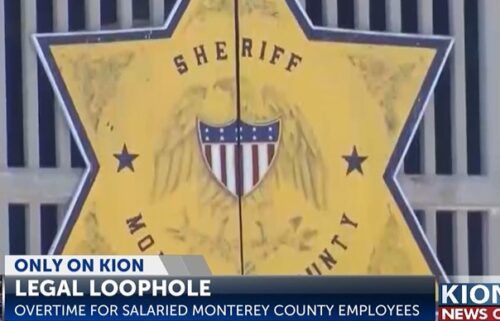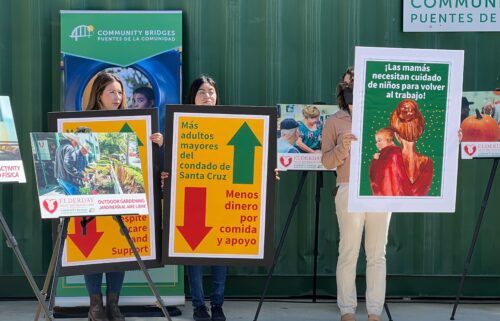Coastal Commission approves staff recommendations on the MST’s SURF! Busway Project
MONTEREY COUNTY, Calif. (KION-TV) -- Thursday afternoon, the California Coastal Commission made a motion to approve the commission's staff suggestions on the MST's SURF! Busway Project in a seven-to-one vote.
The staff recommendation included a project realignment that moved the track slightly above MST's proposed track and allow for dune habitat mitigation as well as public access enhancement and view protections, according to the commission staff.
Spanning over hours of heated discussion and strong support for both the approval of the SURF Project and opposition of the project--including surrounding city mayors and Keep Fort Ord Wild, respectively--the commission opened the floor to many public comments.
Opposition arguments: environmental impacts, questionable funding and rushed planning.
In support arguments: lighter traffic, easier access to the beach and low emission public transit.
MONTEREY COUNTY, Calif. (KION-TV) -- In a lofty, 68-page California Coastal Commission staff report released Friday, the Commission condemned the proposed SURF! portion of the Monterey-Salinas Transit (MST) for pursuing a roughly 4.3-mile stretch of rail corridor that has gone unused since the 1970s.
"While the Commission believes that the Applicant should have opted to not pursue this project as soon as they were informed by Commission staff over five years ago that it was unapprovable under the Coastal Act/LCP, the Commission also notes that this is a classic symptom of the way transportation project funding in California often works, where funding tends to be allocated for projects well in advance of serious environmental analysis and entitlement processes, including for CDPs, and the subsequent analysis appears to bolster an already identified outcome," according to the Coastal Commission. "It is quite clear that this is not a good way to provide for large public infrastructure projects in the coastal zone, and something that all parties involved can acknowledge is something that needs to be addressed, including so that public resources are wisely used."
"We're disappointed but not surprised by the report," said MST CEO Carl Sedoryk. "We knew this was something different; a different type of project for the coastal staff to approve and we provided over 890 pages of documentation that was very little referred to in the report. Some things in that report had never been brought up before."
According to Sedoryk, the Coastal Commission is following the 1973 Coastal Act, which isn't updated to reflect issues that society is currently dealing with, like access to coastal regions and exposure to greenhouse gases. "They are relying on hearsay and disproved arguments," said Sedoryk. "As we continue to see climate emergencies, we have to find a way to build better projects that reduce our carbon footprint. We need to do more of these types of these projects, not less."
The Coastal Commission went on to describe the project (which is proposing a new, two-lane road separated from Highway 1 and outside of the highway right-of-way, according to Sarah Christie, Legislative Director for the California Coastal Commission), as an "old paradigm of needing to constantly build ‘new and more’." They added that utilizing the existing transportation modalities and retrofitting what's already there is the best course of action.
"This community, like others, has extensive transportation infrastructure already in place, including a six-lane freeway in this project area and various surface streets that can be repurposed to something better and more efficient," wrote the Coastal Commission. "Our collective lens should be looking at how to make what’s existing better for the types of transportation we want to incentivize, rather than needing to build something new, particularly when doing so would cause substantial impacts to coastal resources."
A letter to the City of Marina from Keep Ford Ord Wild from last April, stated that due to the nature of this project, the Coastal Commission would never be able to approve the proposed SURF section. KION's Briana Mathaw reported on the dispute last spring.
"The proposed action by the planning commission was premature. Only a very small portion of the SURF project is proposed within Marina’s Local Coastal Plan," wrote Keep Fort Ord Wild spokesperson, Michael Salerno. "However, much more of the project (4.4 miles) is in the jurisdiction of the California Coastal Commission. The Coastal Act makes construction of SURF project impossible because vast portions of the project are proposed in an ESHA where land and habitat cannot be disturbed, filled, or graded."
In the report released July 26, the Coastal Commission talks about five factors that determine the project's rejection: "The Commission’s regulations identify five factors that can aid the Commission in determining if a local government action raises a substantial issue: the degree of factual and legal support; the extent and scope of development involved; the significance of the coastal resources involved; the precedential value for future LCP interpretation; and, whether the issues raised are local or regional/statewide on nature."
The MST says that SURF! buses transit the existing Line 20 between Salinas, Marina, Sand City, Seaside and Monterey, as well as 5th Street Station in former Fort Ord. The MST offered their own statistical packet about the stretch of travel, stating that the project will offer "a five-mile busway–road for buses only–parallel to Highway 1 next to the old rail lines, from Marina to Sand City and Seaside. Here buses will bypass traffic congestion."
"The proposed bus road is simply located in the wrong place considering the sensitivity of the affected coastal resources, and it can’t be found consistent with the Coastal Act and the affected LCP for these reasons," rebutted the Coastal Commission in their July 26 staff report.
"We're pretty confident that this project promotes necessary services in the community," said Sedoryk. "We ultimately need to find a way to move this project forward. The Coastal Commission staff has an opinion but the actual decision will be made by commissioners in August."
A final hearing to revisit this topic was scheduled for Aug. 7 at the King Gillette Ranch on 26800 Mulholland Hwy. in Calabasas, but has since been postponed until September 11 - 13 (all parties will know by August 21 exactly when the hearing will take place).
The a one-time postponement will allow MST and Commission staff to collaborate and work on correcting some of the records, according to Sedoryk.
"The postponement allows MST and the Commission staff to correct some misconceptions and facts in the current report. We will be able to provide a better, more accurate report to the Commission," said Sedoryk. "We are meeting multiple times per week to go over and improve the details to more accurately reflect the project."



